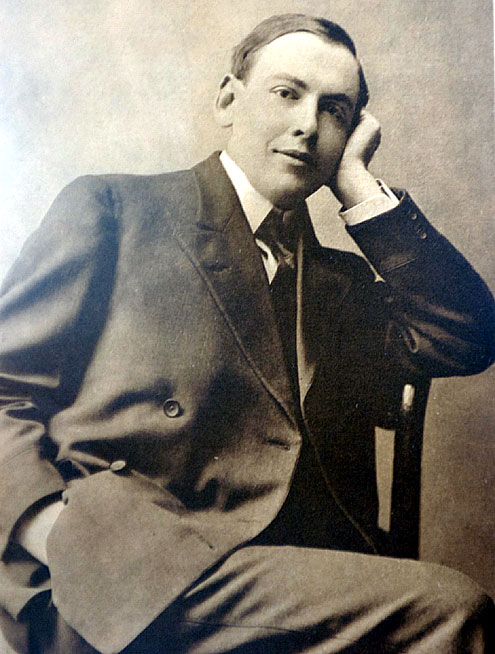When Harry Peyton Steger was notified that he had been selected as a Rhodes Scholar, word reached him at Johns Hopkins University where he was studying Sanskrit -- true to his passion for dead and dying languages. But 120 years ago you would have found a young Steger sitting at his desk in Bonham High School.
It seems fortuitous that, in 1897, Bonham High School officials handed 15-year-old Steger his diploma and wished him well. As it turned out, Harry had much to accomplish and precious little time.
He would be back, though.
In a life that lasted less than 31 years, Steger went from being a rapidly rising star at the University of Texas to become one of the most promising young editors on the East Coast. He edited O. Henry's final book, worked and socialized with Pulitzer Prize-winning author Booth Tarkington and married an actress, but, before launching his career, Steger also found time to come back to Bonham High School to teach Latin for a year.

The world was Harry Peyton's oyster and he had the looks and charm, combined with a brilliant intellect, to throw it wide open.
Somehow it all seems so fitting that Steger's last days as an editor at Doubleday Page & Company in New York City revolved around the art of creating short stories, a skill only a select group of authors possess because it requires capturing so much emotion in relatively little space. Harry Peyton Steger's life was a brilliantly crafted short story. Unfortunately it wasn't graced with an artful ending like the ones penned by his friend, O. Henry.
So just who was this local boy turned literary figure? As is the case with so many North Texas residents, the Steger story begins in Tennessee.
Harry Peyton Steger was born in Moscow, Tennessee, not far from Memphis, on March 2, 1882. Harry’s father, Thomas Steger, moved the family to Bonham where young Harry began school as an inquisitive six-year-old. Actually, it seems Thomas was one of five Steger brothers who relocated to Bonham about the same time and quickly became an integral part of a thriving local business scene.
There was the Steger Opera House, Steger Mill, Steger Lumber and Thomas Steger was a lawyer credited with managing Sam Rayburn’s congressional campaign in 1914. So, Harry Peyton Steger was hewn from solid timber and the family's intellectual attributes can be traced all the way back to Harry’s great-great grandfather, John Jefferson, brother of one of America’s truly great thinkers, Thomas Jefferson.
In the 1890s, Harry’s relatively affluent world in Bonham was centered around education and culture, with a little time in the saddle thrown in for good measure. By special permission of the University of Texas Regents, he was allowed admittance to UT in 1897 as a mere 15-year-old.

At UT, Steger blossomed. He became editor of the campus newspaper, The Daily Texan, as well as the campus yearbook. Steger’s roommate at UT for a period was Roy Bedichek and another close friend was John A. Lomax. Bedichek became a noted naturalist and Lomax went on to carve out a unique niche in history as a celebrated folklorist.
Harry and “Bedi” shared a love for the classics as well as an interest in campus politics. According to the Texas Library Journal, it may have been Steger’s political activism and his role as campus newspaper editor that prevented the Bonham High School graduate from being commissioned as the first Rhodes Scholar from UT, even though he was the first to qualify academically.
According to Steger, he was a “naughty boy” during his time as editor, but his friends evidently strongly opposed the punishment when UT skipped over Steger to name its first Rhodes Scholar. Again, according to the Texas Library Journal, a protest over the scholarship debacle resulted in the first official "riff" between students and administrators at the University of Texas.
Steger returned to Bonham briefly where he taught Latin and Greek before enrolling at Johns Hopkins University to study Sanskrit. It was at Johns Hopkins, a year after the “naughty boy” incident, that Steger was officially selected to be a Rhodes Scholar, becoming the second UT grad to share that honor.
The Letters of Harry Peyton Steger 1899-1912 offer an enlightened glimpse of a Fannin County boy abroad.
September 29, 1905
Mr. John A. Lomax, College Station, Texas
My dear Lomax:
I leave tomorrow for London, via Cologne, Vlissingen and Queensboro. The three months of Germany, spent in the midst of a German family, have been constantly delightful. Never was I more energetic, more cheerful, more ambitious; and, to fill my sweet cup, I can truthfully say that I can speak German. For two months now no word of English has passed the fence of my teeth. (Thanks, Homer, for that phrase!)
November 25, 1905
My dear Folks:
Last night I attended the annual Rhodes Dinner. Cecil Rhodes, as you may know, left a fund for this function and this year $1,500,000 were expended. There were nearly 200 present. The hall was a gorgeous sight. Nothing but evening clothes were to be seen. Rudyard Kipling was one of the guests. He wrote his name for me, as well as the other Rhodians; and I have preserved it in my toast-list. Lord Milne, Sir Lewis Mitchell and numerous other nabobs and potentates were also in evidence.
January 9, 1906
Dear Folks:
Lady Monkswell (one of the swellest of the English nobility) has invited all of the Rhodes Scholars to a reception at her town-house (in London) on the 18th inst. My curiosity bids me go, but my wardrobe, with more force, bids me stay. You see, to be observed, in London, on the streets, in the afternoon, or even in a home, without a frock coat and a high silk hat, or else a Prince Albert, would be as rude as appearing in pajamas. I tell you this because I think it will amuse you. There is never a place in the world where formality in dress counts for so much as it does in London. Of course, it is all silly rot.
to be continued...